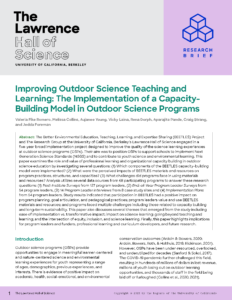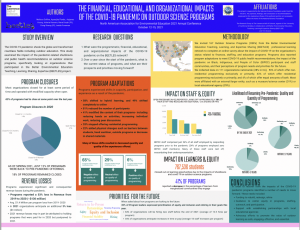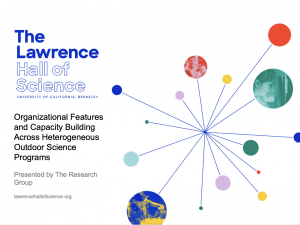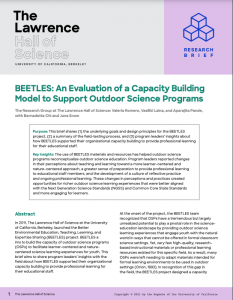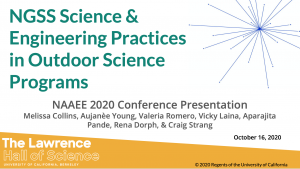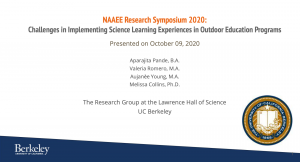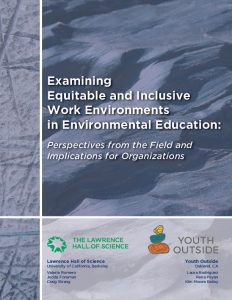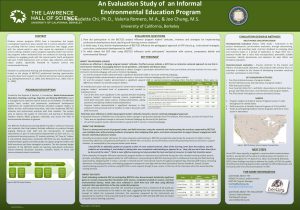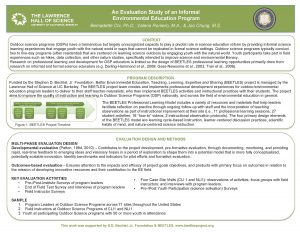Research and Evaluation
Evaluation for the BEETLES project is completed by The Research and Impact Group at the Lawrence Hall of Science.
Currently, the Research and Impact Group of the Lawrence Hall of Science is conducting a five-year research study. The research team will examine the implementation and efficacy of the BEETLES program and the field of outdoor science at large. In the implementation study, the team will investigate the instructional practices in outdoor science programs and the role of BEETLES materials and resources in supporting high-quality learning experiences. In the efficacy study, the team will investigate the impacts of outdoor science programs on students’ STEM Activation (a composition of dispositions, skills, and knowledge) and environmental literacy. Research findings will contribute to the field by providing evidence of the impact of BEETLES in the environmental education field and the impact of outdoor science programs on youth science learning.
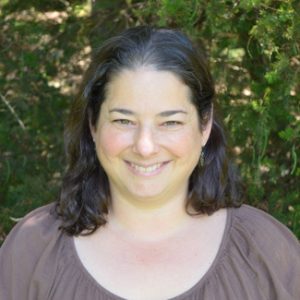 Rena Dorph, Ph.D., is the Principal Investigator of the BEETLES research study. Currently the Interim Director of the Lawrence Hall of Science, Rena served as the Director of the Research Group (now Research & Impact Group) for 13 years. Rena has worked in the field of educational research and evaluation for over 20 years exploring the relationship between learning experiences and outcomes, paying consistent attention to issues of equity, access, and impact. Rena received a B.A. in Psychology from the University of California, Davis; an M.A. in the Sociology of Education from Teachers College at Columbia University; and a Ph.D. in Educational Policy, Organization, Measurement, and Evaluation from the University of California, Berkeley’s Graduate School of Education.
Rena Dorph, Ph.D., is the Principal Investigator of the BEETLES research study. Currently the Interim Director of the Lawrence Hall of Science, Rena served as the Director of the Research Group (now Research & Impact Group) for 13 years. Rena has worked in the field of educational research and evaluation for over 20 years exploring the relationship between learning experiences and outcomes, paying consistent attention to issues of equity, access, and impact. Rena received a B.A. in Psychology from the University of California, Davis; an M.A. in the Sociology of Education from Teachers College at Columbia University; and a Ph.D. in Educational Policy, Organization, Measurement, and Evaluation from the University of California, Berkeley’s Graduate School of Education.
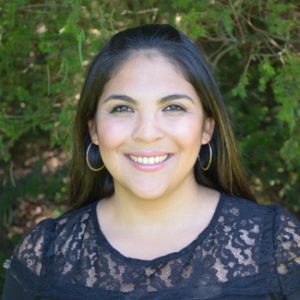 Valeria Romero, M.A., is an Associate Research and Evaluation Specialist at The Research Group and co-leads research and evaluation for the BEETLES project. Ms. Romero supports a variety of research and evaluation projects related to science professional development initiatives and programs aimed to increase underrepresented minority students in science disciplines. Valeria received her master’s degree in educational leadership from Mills College.
Valeria Romero, M.A., is an Associate Research and Evaluation Specialist at The Research Group and co-leads research and evaluation for the BEETLES project. Ms. Romero supports a variety of research and evaluation projects related to science professional development initiatives and programs aimed to increase underrepresented minority students in science disciplines. Valeria received her master’s degree in educational leadership from Mills College.
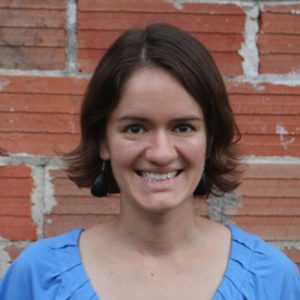 Melissa Collins, Ph.D., is co-leading the BEETLES research activities. As a Research Specialist in the Research & Impact Group at the Lawrence Hall of Science, she contributes to a range of research and evaluation projects related to STEM education, teacher professional development, and out-of-school learning. She has over ten years of experience in educational research and evaluation in a variety of contexts and content areas, including early math and literacy, K-12 assessment, and social development for children with disabilities. She received her B.A. in Psychology from Harvard College and her Ph.D. in Applied Developmental and Educational Psychology from Boston College, where she conducted research on the foundational skills and concepts of early mathematics and the factors predicting kindergarten readiness for children from diverse socioeconomic backgrounds.
Melissa Collins, Ph.D., is co-leading the BEETLES research activities. As a Research Specialist in the Research & Impact Group at the Lawrence Hall of Science, she contributes to a range of research and evaluation projects related to STEM education, teacher professional development, and out-of-school learning. She has over ten years of experience in educational research and evaluation in a variety of contexts and content areas, including early math and literacy, K-12 assessment, and social development for children with disabilities. She received her B.A. in Psychology from Harvard College and her Ph.D. in Applied Developmental and Educational Psychology from Boston College, where she conducted research on the foundational skills and concepts of early mathematics and the factors predicting kindergarten readiness for children from diverse socioeconomic backgrounds.
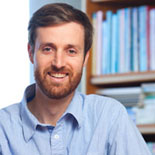 Mac Cannady, Ph.D., is the quantitative lead on the BEETLES research study. As the Director of Quantitative Studies for the Research & Impact Group at the Lawrence Hall of Science, Mac provides research design and statistical analysis expertise to several projects. His work aims to improve the internal validity and enhance the effectiveness of quantitative research and evaluation projects. Currently, his work includes investigating pathways and barriers to science, technology, engineering, and mathematics (STEM) careers, analyzing the effectiveness of professional development programs, and reviewing research on teacher education. He taught physics to high school students for several years after earning a bachelor’s degree in engineering physics from Santa Clara University. Mac received his doctorate in educational research, measurement, and evaluation from Boston College.
Mac Cannady, Ph.D., is the quantitative lead on the BEETLES research study. As the Director of Quantitative Studies for the Research & Impact Group at the Lawrence Hall of Science, Mac provides research design and statistical analysis expertise to several projects. His work aims to improve the internal validity and enhance the effectiveness of quantitative research and evaluation projects. Currently, his work includes investigating pathways and barriers to science, technology, engineering, and mathematics (STEM) careers, analyzing the effectiveness of professional development programs, and reviewing research on teacher education. He taught physics to high school students for several years after earning a bachelor’s degree in engineering physics from Santa Clara University. Mac received his doctorate in educational research, measurement, and evaluation from Boston College.
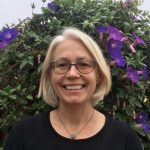 Kelly Grindstaff, Ph. D., is a Research Associate at the Lawrence Hall of Science. Kelly joined the Research Group in 2020, bringing extensive experience in science and STEM education as a teacher (middle school and high school), researcher, evaluator, teacher educator, and designer/provider of professional development for teachers and outreach programs for students. She began her teaching career in Ontario and British Columbia, earned her PhD in Curriculum, Teaching and Educational Policy from Michigan State University, and served as the Project Manager for Teacher Professional Development in STEM at Rensselaer Polytechnic Institute in upstate New York. Thus Kelly brings a variety of skills and experience from diverse contexts to enrich her work with the Research Group. Kelly is deeply committed to fostering engagement and learning in the intertwined STEM disciplines – especially for those who have had limited access and/or are from backgrounds underrepresented in STEM fields and careers. She has a career-long interest in the environment and sustainability, and in helping teachers engage students, connecting to their lives and communities through STEM, and addressing real-world issues such as food production and waste, and energy sources and efficiency.
Kelly Grindstaff, Ph. D., is a Research Associate at the Lawrence Hall of Science. Kelly joined the Research Group in 2020, bringing extensive experience in science and STEM education as a teacher (middle school and high school), researcher, evaluator, teacher educator, and designer/provider of professional development for teachers and outreach programs for students. She began her teaching career in Ontario and British Columbia, earned her PhD in Curriculum, Teaching and Educational Policy from Michigan State University, and served as the Project Manager for Teacher Professional Development in STEM at Rensselaer Polytechnic Institute in upstate New York. Thus Kelly brings a variety of skills and experience from diverse contexts to enrich her work with the Research Group. Kelly is deeply committed to fostering engagement and learning in the intertwined STEM disciplines – especially for those who have had limited access and/or are from backgrounds underrepresented in STEM fields and careers. She has a career-long interest in the environment and sustainability, and in helping teachers engage students, connecting to their lives and communities through STEM, and addressing real-world issues such as food production and waste, and energy sources and efficiency.
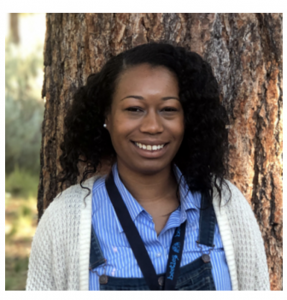 Aujanèe Young, M.E., is the Research Coordinator for the Research Group at the Lawrence Hall of Science. She supports the research efforts of the BEETLES Project through data coordination, data collection, and analysis. She obtained her bachelors’ degrees in Anthropology and Sociology from Michigan State University and recently completed a Master of Education with a concentration on curriculum and instruction.
Aujanèe Young, M.E., is the Research Coordinator for the Research Group at the Lawrence Hall of Science. She supports the research efforts of the BEETLES Project through data coordination, data collection, and analysis. She obtained her bachelors’ degrees in Anthropology and Sociology from Michigan State University and recently completed a Master of Education with a concentration on curriculum and instruction.
In addition, the evaluation for The BEETLES NSF AISL grant is supported by the Center for Research in Lifelong STEM Learning at OSU and lead by (bios and images from Center’s website):
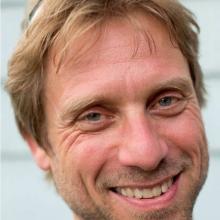 Martin Storksdieck, Ph.D., is the Director of the Center for Research on Lifelong STEM at Oregon State University. Prior to his current role, Dr. Storksdieck served as the Director of the Board on Science Education (BOSE) at the National Research Council (NRC) of the National Academy of Sciences. His prior research focused on what and how we learn when we do so voluntarily, and how learning is connected to our behaviors, identities and beliefs. This includes the role of personal perspectives in science learning, particularly related to controversial topics such as climate change or evolution, and how connections between school-based and out-of-school learning can create and sustain lifelong interest in science, but also learning itself. He holds an M.S. in biology from the Albert-Ludwigs University in Freiburg, Germany; an M.P.A. from Harvard University’s Kennedy School of Government; and a Ph.D. in education from Leuphana University in Lüneburg, Germany. Storksdieck also directs NRC’s Roundtable on Climate Change Education.
Martin Storksdieck, Ph.D., is the Director of the Center for Research on Lifelong STEM at Oregon State University. Prior to his current role, Dr. Storksdieck served as the Director of the Board on Science Education (BOSE) at the National Research Council (NRC) of the National Academy of Sciences. His prior research focused on what and how we learn when we do so voluntarily, and how learning is connected to our behaviors, identities and beliefs. This includes the role of personal perspectives in science learning, particularly related to controversial topics such as climate change or evolution, and how connections between school-based and out-of-school learning can create and sustain lifelong interest in science, but also learning itself. He holds an M.S. in biology from the Albert-Ludwigs University in Freiburg, Germany; an M.P.A. from Harvard University’s Kennedy School of Government; and a Ph.D. in education from Leuphana University in Lüneburg, Germany. Storksdieck also directs NRC’s Roundtable on Climate Change Education.

